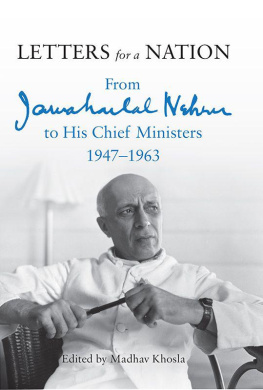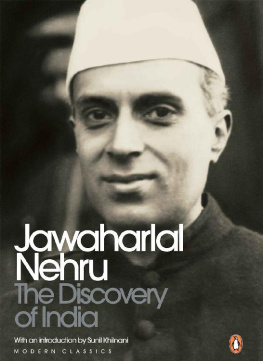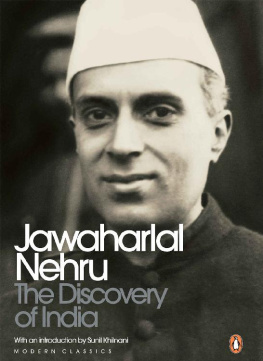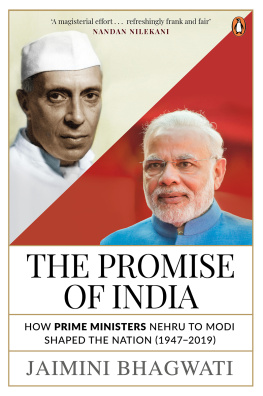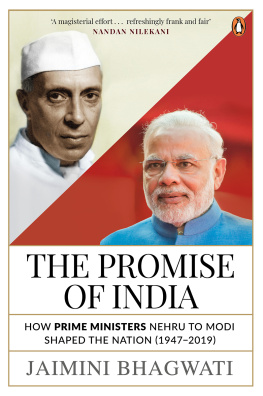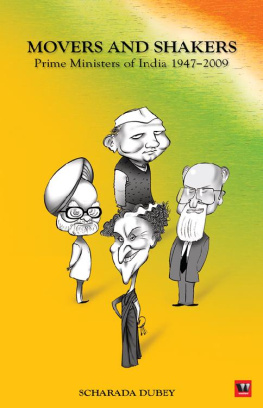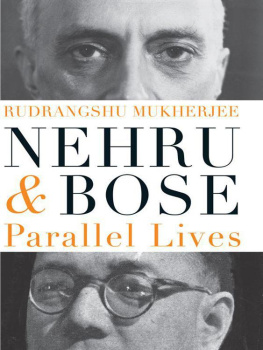Introduction
I was not much of a politician, Jawaharlal Nehru wrote in The Discovery of India, although politics had seized me and made me its victim. A key figure in the freedom struggle and nationalist movement, a man who spent nearly a decade in prison before becoming independent Indias first prime minister from 1947 to 1964, Nehrus life was in many ways defined in terms of his political career. Yet politicsa domain of pressing, ceaseless demandsoffered an uneasy career for those like him who strove for self-reflection and sought careful scrutiny of their own actions. It was perhaps this feeling of never quite being at home in politics which repeatedly drove Nehru to better understand political action: its predicaments, its potential and its call for constant reinvention. It was in this vein that Nehru chose to write to heads of Indias provincial governments on 15 October 1947, a mere two months after Independence.
[I]t is in times of exceptional stress like the present, he observed, that it is more than ordinarily incumbent on us to keep in close touch with each other, so that we can put forth concerted efforts to overcome the grave dangers facing us. Nehru proposed to form the habit of a fortnightly exchange of letters, and the letter of 15 Octoberthe first of this exchangeinitiated a political practice that he continued until a few months before his death in 1964. Barring the occasional lost deadline and several additional letters, Nehru wrote to his chief ministers on the 1st and 15th of each month and the fortnightly target was met with remarkable regularity. By the time Nehru wrote his final letter on 21 December 1963, nearly four hundred letters had been written.
Why were these letters written and what importance do they have? The home minister in Vikram Seths A Suitable Boy didnt know the answer. He wondered why Nehru bothered to write these well-meaning letters... every month to the Chief Ministers which they are not delighted to read. Do you know what they contain?, the minister caustically noted, Long homilies about Korea and the dismissal of General MacArthur. What is General MacArthur to us?yet so noble and sensitive is our Prime Minister that he considers all the ills of the world to be his own. He means well about Nepal and Egypt and God knows what else, and expects us to mean well too. He doesnt have the least idea of administration but he talks about the kind of food committees we should set up. The minister was wrong about the frequency of the lettersthey were fortnightly not monthlybut he rightly understood that they were unlike standard official correspondence and ordinary memoranda detailing the tasks of daily government. There are at least three reasons why they are significant.
The first is for an understanding of Nehrus political ideas. Of Nehrus writings, the most famous continue to remain his three booksGlimpses of World History (1934), An Autobiography (1936), and The Discovery of India (1946). These books cast light upon Nehrus to nineteenth- and twentieth-century Indians, but no other attempt whether it was Ambedkars efforts to historically explain lower-caste oppression, or claims by economic nationalists to expose the financial costs of colonialismcould match the Discovery in its ambition and scale. Through an account of changing political fortunes it revealed the possibility of radical transformation of an entire nation.
Nehrus three books share important similaritiesthey are all rich in their turn to history, they were all written largely in jail, and, most importantly, they were all written before Independence. As a consequence, they do not process his role as prime minister, and provide an imperfect, if helpful, understanding of Nehrus political vision. The letters are crucial to an appreciation of that role. Although Nehrus writings before Independence demonstrate his commitment to political and economic freedom, it was only after Independence that he fully clarified the relationship between the two. While his commitment to socialism and his unease with violent communism was consistent throughout, his concerns broadened as prime minister to include the procedural and formal features of democratic rule. The inner workings of self-government received far greater attention than they had previously invited, and marked a phase in Nehrus life where the importance he placed on political freedom moderated a certain economic radicalism. This emphasis on political freedom shifted attention towards the means through which democracy could be consolidated. Now, as prime minister, Nehru was at pains to emphasize that democracies had no special claim to survival. They were as likely to succeed or fail as any other form of political association, and Indias liberty was as contingent as its captivity had been. Indians could not merely adopt democracy; they would have to develop it.
Nehrus effort at creating norms for the exercise of public power sought to fortify the fragility he saw inherent in any political Making a nation, rather than merely administering it, was Nehrus unique responsibility. The letters not only analyse that enterprise of nation-buildingthey themselves were part of its ingredients.
A second reason, therefore, why the letters matter is for the historical record they provide. Through detailing the trials and errors, the events and personalities, and the hopes and challenges The letters begin as independent India did, preoccupied with Partition violence and the threat and tragedy of communal carnage; mass migration and the largest refugee crisis in human history; the troubled integration of Junagadh, Hyderabad and Kashmir; right-wing extremism and the assassination of Gandhi; left-wing extremism and communist violence; the food emergency, and the drafting of a constitution. They proceed to cover domestic landmarks like Indias first general elections, and international efforts at refashioning global politics such as the Bandung Conference. Economic planning and state-directed development are given special emphasis throughout. Both planning and development found concrete shape in the five-year plans, the first two of which underscored the importance of agriculture and industrialization respectively. Indias relations with the world are similarly highlighted including its association with China and the war of 1962. Several crises and tensions that occupy Nehrufrom the rights of minorities to limitations in state capacity to the ongoing tensions with Pakistansurface repeatedly in the letters, as they did during Nehrus prime ministership. Because of their fortnightly character, the letters painstakingly catalogue the nations journey from 1947 to 1963. As such, they are the inevitable starting point for the history of independent India.
The letters were written with authority but they were not instructions. Part of their charm lies in Nehrus emphasis on concerted efforts and coordinated action. There is hardly any sense of Nehru being largely unchallenged, as in fact he was, during his term. Within the Congress party, he faced little competition after Sardar Patels death in 1950 and Purushottam Das Tandons resignation as party president in 1951. At the national level, the Nehru years saw an eclectic mix of Opposition partiesthe Socialist Party, the Communist Party of India, the Bharatiya Jan Sangh, the Swatantra Partybut none offered any sustained political resistance to the Congress. The Opposition presence in the Lok Sabha in the three elections of 1952, 1957 and 1962 never really crossed the quarter mark. And it took a decade after Independence when, with the Communist victory in Kerala in 1957, India got its first non-Congress state government. It is this unrivalled power which makes so striking Nehrus self-description in the letters as being merely the first among equals.

